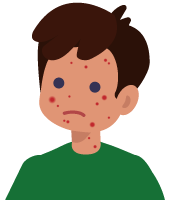How to cope with common summer ailments
Whilst most of us welcome the summer weather, higher temperatures and exposure to the powerful summer sun can cause headaches, skin rashes and sunburn.
With favourable weather conditions for bacteria, virus and other parasites to breed, the summer months can also usher in a host of more serious health problems and diseases.
Take preventative steps to protect your and your family’s health this summer…

Sunburn
Some of the symptoms of sunburn include red, hot and sore skin. In most cases it will flake and peel after a few days. You can treat it yourself – ask your local pharmacist for advice and treatments for sunburn.
If your sunburn has caused your skin to blister or swell, your temperature is very high, you feel hot and shivery, very tired or sick you may have heat exhaustion or heat stroke which can be very serious – call NHS 111 if you need more advice.
To protect yourself from getting sunburn, apply a high SPF sunscreen lotion on the exposed areas of your body 20 minutes before heading out in the sun.
Heatstroke
Heatstroke is another common summer disease which, if left untreated, can be fatal. Some of the symptoms of heatstroke include:
- feeling unwell after 30 minutes of resting in a cool place and drinking plenty of water
- not sweating even when feeling too hot
- difficulty breathing
- rapid pulse
- high body temperature
- confusion
Call 999 if you or someone else has any of these signs of heatstroke.
Top tips to keep your body from overheating in summer and well hydrated:
- Avoid going outside between 11am–3pm when the sun is at its hottest.
- Drink plenty of cold drinks, especially when exercising.
- Take cool baths or showers.
- Wear light-coloured, loose clothing.
- Avoid excess alcohol and extreme exercise.

Prickly heat
Prickly heat refers to red rashes that occur due to an excess of humidity and heat.
Prickly heat may be caused by clogging of the sweat glands. Keep your skin cool so you do not sweat and irritate the rash by wearing loose cotton/natural fibre clothes, using lightweight bedding, taking cool baths or showers and by drinking plenty of fluids to avoid dehydration.
To calm the itching or prickly feeling, apply something cold such as a damp cloth or ice pack (wrapped in a tea towel) for up to 20 minutes, tap or pat the rash instead of scratching it and stop using perfumed shower gels or creams.
Your local pharmacist can also give you advice and suggest the best treatment to use.
Insect bites
With the warmer weather, out come the bugs!
Insect bites and stings will usually cause a red, swollen lump to develop on the skin which can be itchy and painful. Most insect bites and stings are not serious and will get better within a few hours or days.
Some people have a mild allergic reaction where a larger area of skin around the bite or sting becomes swollen, red and painful. This should pass within a week.
Your pharmacist can recommend medicines that can help, such as painkillers, creams for itching and antihistamines.
Occasionally, a severe allergic reaction can occur, causing symptoms such as breathing difficulties, dizziness and a swollen face or mouth. This requires immediate medical treatment.
What to do if you’ve been bitten or stung
- Remove the sting or tick if it’s still in the skin
- Wash the affected area with soap and water
- Apply a cold compress (such as a flannel or cloth cooled with cold water) or an ice pack to any swelling for at least 10 minutes
- Raise or elevate the affected area if possible, as this can help reduce swelling
- Avoid scratching the area, to reduce the risk of infection
- Avoid traditional home remedies, such as vinegar and bicarbonate of soda, as they’re unlikely to help

Food poisoning
Excessive heat in summer can spoil food very quickly. To prevent the risk of food poisoning, put leftover food in the refrigerator.
Remember if you’re having a BBQ, food must be thoroughly cooked! You can use a meat thermometer to check if things are cooked through.
Diarrhoea
Skin rashes

